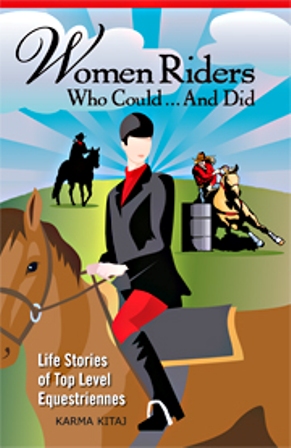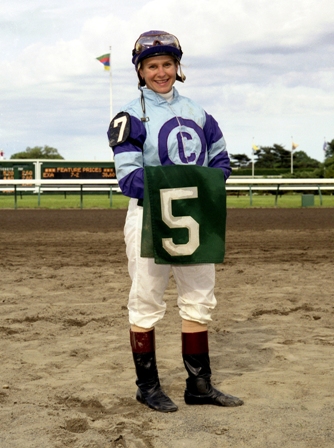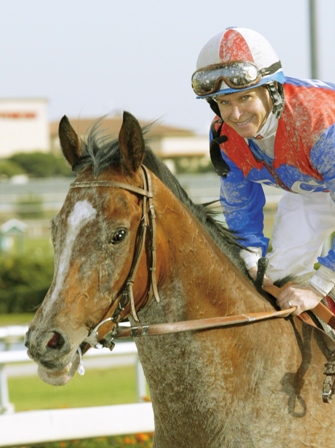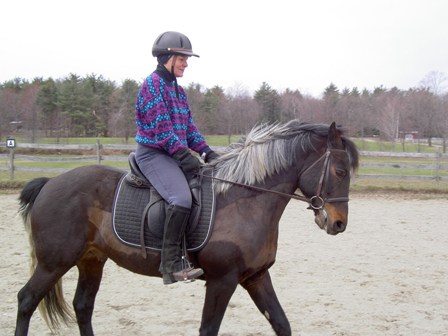As I mentioned last week, I would like to share an interview I composed with Karma Kitaj, author of the book “Women Riders Who Could…and Did: Life Stories of Top Level Equestriennes.” The book features the stories of women professionals from various areas of the equine industry, including the now retired jockey Julie Krone.
Krone became the first female jockey to win a Triple Crown race when she captured the Belmont Stakes (gr. I) aboard Colonial Affair in 1993, and the first woman to be inducted into the National Museum of Racing Hall of Fame in 2000.
Kitaj, who bought her first horse and started riding regularly at age 50, spent seven years interviewing 13 horsewomen from across the country, writing, and publishing her book. And now, her painstaking efforts are paying off in the form of the praise she has received for her inspiring, non-fiction novel.
Thanks for taking the time to tell us about your book, Karma!

EM: Tell me about how you came up with the idea to write this book and what was the process like?
KK: I’m a writer, a blogger, life coach, and psychotherapist, so I talk to people a lot about their life stories. I had published another book in 2002, which was based on life stories of women artists and scientists. Once I got really involved with horses, I decided my next book should be about top level horsewomen. I’ve always been interested in how people define their career success.
What I found is the people that have reached the top echelons of their field don’t think, ‘How did I get here?’ They just follow their noses. They were so passionate about what they were doing, and with a few exceptions, they didn’t think, ‘I want to be at the top of this field,’ but they got there by how passionate and determined they were, and they wouldn’t take no for an answer.
Julie Krone rose from having very little and a lot of obstacles. She as well as the other women I interviewed just pushed themselves up there because they were so determined, and they persevered no matter what. That’s the common ground with all the women I talked to. I didn’t really know anything about horse racing and what jockeys did before talking to Julie.
EM: Why did you pick Julie Krone as one of the subjects of your book? Also, after talking with her, what were your impressions of the Thoroughbred industry and what does that kind of a working environment seem to be like for a woman?
KK: I was going out to Los Angeles to interview Kathy Kusner, the first woman to get a jockey’s license in the United States, and she arranged the interview with Julie. Julie wrote a memoir called “Riding for My Life." She’s a real pistol. When I met her, she was about 40.

Julie Krone at Monmouth Park, photo by EQUI-PHOTO
When she first started out in the industry, she was pretty wild. (In my book), I interwove the way she told me her story with other things that have been written about her and things from her memoirs.
Julie was really tiny, and she was incredibly agile and athletic from the time she was a baby. Her mother was a pretty excellent horsewoman herself and taught her how to ride. She put her on a horse when she was still in diapers. The horse took off, and she took the reins and the horse trotted back. She’s been completely fearless since then. At one point, she even wanted to be a gymnast in the circus.
Julie was also ostracized a lot as a child because she had a form of ADD (attention deficit disorder), so she really couldn’t learn very effectively. She couldn’t concentrate, couldn’t focus, and the only things she loved in school were gym and art. She was so little and skinny, that even when she was a teenager, kids made fun of her and called her a runt. She also had a high, squeaky voice, so she was never really accepted by the kids in her class.
As an early adolescent, she got the idea that she wanted to be a jockey, and her her mother finally gave in and supported her. Julie’s family was totally unstructured, so she grew up wild. They never had dinner times, and both of her parents were very involved in their own stuff, and they eventually went through a terrible divorce.
She did have a lot of support from her mother, but it sounds like it was pretty conflicted. Sometimes she felt like her mother was her best buddy, and the next minute she would hate her because of the way her mother was treating her. She didn’t really know much about how to get along in a social relationship, even though she was an expert rider. When she was 15, her mother took her to Churchill Downs to try and get a job. She fudged her age, because you had to be 16, so she started working on the track when she was 15.
A lot of the story in my book was what happened once she started getting into the racing industry and how tumultuous her life was. There were mainly men in the industry, some of which could be pretty macho. In order to prove herself (this was 25 years ago), at first the only thing she could figure out what to do was act like a man—she would physically fight with these guys.
She told stories about how they would try and drive her off the track, but she was just so savvy—kind of like a street kid in making her point. So she got the reputation of being the diabolical rider, because she would kind of pin people over to one side (on the track) so they wouldn’t be able to get through, and then she would sneak through real quickly and win.
(Krone retired in 2008 after riding for 27 years. She had won 3,705 races from 21,415 starts, for earnings of $90,139,558).
The one thing that I have always thought about in terms of the racing industry is how the horses are treated, and Julie has always loved horses, and her way of riding was so different from that of some of her other colleagues.She was very gentle with the horses and didn’t use the whip much. She used her instincts and her intuition. From what I could tell from talking to her, that’s not always the case (with other riders).
Also, I know a lot of these horses off the track that don’t have a very good life. So that’s one thing that didn’t turn me on about that industry. But I did get a good appreciation for what it’s like to be up there on a horse that’s moving 40 miles an hour, with all those other riders. You hardly have any space between riders, and you’re up there pretty high, pretty much standing up. That to me is just incredibly intriguing.

Julie Krone after winning the 2003 Vernon O. Underwood Stakes (gr. III) aboard Watchem Smokey, photo by Benoit
Probably the reason Julie retired was because she got some terrible injuries, and she finally started to realize she could die doing that. It was kind of a life and death thing with her…she felt like if she didn’t keep winning, she was going to die. She had some really extreme beliefs about it. But then she started to have a life outside horse racing—she got married to Jay Hovdey, a writer for the Daily Racing Form, and then she had a child, so I think for the first time, she started to have a life outside the track and decided she could live a more balanced life, so she was ready to give racing up.
She’s now gotten into Parelli Natural Horsemanship and motivational speaking. She’s changed things a little bit and gotten less extreme in her life. Even she, who was so fearless, realized it was a dangerous business.
EM: What are the main concepts that you have taken away from writing this book about how women have succeeded in various aspects of the horse industry?
KK: The Thoroughbred racing industry sounds like it’s the most extreme—there are mostly still men in that industry.
But the majority of other people that own horses and ride horses seem to be women. Even though there seem to be so many more women that do it, and even though the horse is the equalizer so men and women can compete in the same sports, there are so many more men that make it to the top. I didn’t really realize this until I asked people to write blurbs and testimonials (for my book).
I think it’s some sexism, and has to do some with the fact that women are the ones that have the children and have to take time off to take care of their children, whereas the men have more of a choice to devote more of their energy toward getting to the top of their field if that’s what they want.
EM: After writing this book, what would your advice be to other women that are passionate about the equine industry, but are discouraged about how to be successful and remain strong in the midst of a male-dominated environment?
KK: The women in the book speak to that…what they say is to just follow your heart and do what you do best. Some of the women, especially as they got older, turned to training and coaching and excelled at that. I think as in any field, it’s about following your own passion and doing what you love and not getting waylaid by what other people might think of you.
Click here to watch a video trailer for "Women Riders Who Could...and Did."
Click here to read an excerpt from the chapter of the book about Julie Krone.
Click here to order Kitaj's book on Amazon.

Karma Kitaj aboard her Lippett Morgan Horse, Barretown Diamond




